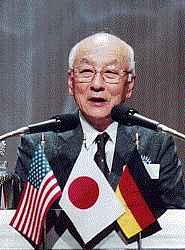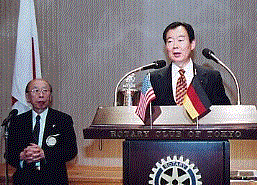Rotary Awareness Month
January 21, 2004
Mr. Shohei Nakamura
Past Governor of our District 2580
 Observing Rotary International��s Rotary Awareness Month, Past Governor Shohei Nakamura of our District 2580 was invited to speak at our meeting of January 21: Let me tell you of what is happening in the Rotary world today.
Observing Rotary International��s Rotary Awareness Month, Past Governor Shohei Nakamura of our District 2580 was invited to speak at our meeting of January 21: Let me tell you of what is happening in the Rotary world today.
Rotary International is emphasizing its Polioplus movement which started 20 years ago. Some of you may remember that 15 years ago, each Rotarian was asked to contribute 40,000 yen for the cause, and a total of 240 million US Dollars was obtained. With this money, vaccine was purchased which was turned over to the WHO, and it was though that this would do the job.
However, things were not that simple, as a new call came telling us that polio would be eradicated by the year 2000, and a celebration marking the event would take place at the Centennial Convention.
Fortunately, governments around the world started to take action regarding polio, and the Japanese Government also contributed a large amount of money for this purpose. Japan, North and South America, Europe, China and the Pacific Area became polio free. By conducting national immunization days, even a large country like China eradicated polio. Yet polio remains in India and Pakistan, Nigeria and a handful of African countries.
What will the next large project be? We do not know at this moment, but your club is actively engaged in the removal of land mines in Cambodia.
President Majiyagbe, who hails from Nigeria has told us ��Helping hands are held out to victims of natural disasters and acts of terrorism, but there are other conditions which are just as destructive, and they are poverty, illiteracy and illness��, ��and asked us to give them help.
20% of the world population, or 1.2 billion persons today live on an income of less than a dollar a day. On the other hand, it is said that we could not sustain life on earth if everyone tried to live as well as we. Therefore, the issue becomes that of birth control. President Majiyagbe believes that education is the key to resolving this issue. If more mothers could be educated, they would wish for their children to live a more meaningful life, and thus lesson their offspring.
There is an opinion that the Rotary Club should be the center of any service activities, and that it is irregular that Rotary International conduct service projects. What surprise me is the proliferation of Task Forces which acts as a medium for a top-down structure for Rotary.
In Japan, we believe that Vocational Service is the basis of Rotary, and Rotarians in Taiwan and Korea share our feelings. However, RI Presidents in recent years have looked upon Vocational Service as providing vocational training to youth and such, and I believe President Majiyagbe shares this policy.
On the other hand, Immediate Past R.I. President Rattakul spoke on this matter which relieved Japanese Rotarians very much. It worries me that the R.I.��s considerations are departing from what we believe to be Rotary��s basic philosophy.
In June, this year, the Council on Legislation will take place. How will our Constitution and Bylaws change from their deliberations?
In order to gain more members, R.I. has relaxed its many rules which have been its most respected characteristics. Should we lose sight of the basics of Rotary in order to gain members at any cost? I really do not understand.

Mr. Edwin A. Futa, General Secretary of Rotary International who visited Tokyo on a business trip attended our regular meeting of January 21 and addressed it briefly, giving greetings.